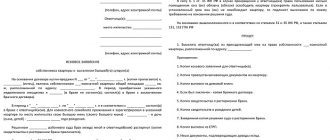In what cases is a person deprived of his registration without his consent?
There are a number of situations in which the court is most likely to side with the plaintiff in such a case:
- divorce. If one of the spouses does not have his own share in the apartment, then the second after a divorce can write him out, as well as his relatives. Such situations fall under Art. 31, paragraph 4 – termination of family relations.
Read about how you can expel a former spouse who is not the owner from an apartment here, and we talk about how to correctly expel an ex-wife without her consent, and what to do if you have a child, in our article.
This item may include families where there is a rift between children and parents or other relatives. But the court is less sympathetic to such cases.
- If the apartment belongs to the municipality (not privatized) , and is not used for its intended purpose (read about the features of extracting from a municipal apartment here). They can also be discharged from such housing on the grounds that the rights of neighbors are being violated or the premises are being damaged. This possibility is spelled out in Art. 91 LCD. The following order is required: a statement - a warning - if it is ignored, it can be written out.
- Parents of a child who have been deprived of parental rights may be deprived of their registration if, by a court decision, they should not live with him. This is also regulated by Article 91 of the Housing Code. Eviction does not involve providing them with another place to live.
- You can discharge someone who does not appear in the apartment for a long time , is completely absent there, and at the same time does not pay utilities. This is only possible if he has other housing.
- From privatized housing, the court usually freely discharges those who were registered there by the owner after privatization . This is regulated by Art. 31 LCD. The exception is minors: the court will not discharge them, because it is forbidden.
- You can freely deregister those who previously lived in the apartment if the living space was received as a gift or was inherited.
- A minor child can be deprived of his registration if he lives in another place with someone who is officially his guardian .
Some of the situations described above have their own nuances that can simplify or complicate the procedure. But in most cases, the court discharges “extra” tenants at the request of the owner without difficulty.
A controversial issue in the Housing Code remains the question of how long a person must not live in an apartment for this to be sufficient grounds for depriving him of registration.
The court usually considers cases where the absence lasts 3-4 years or more . Circumstances also play a significant role. The reasons why he does not live there are important.
Statement of claim to court
The owner is obliged to warn the tenant about eviction a month before filing, i.e., try to resolve the issue peacefully. If the place of his actual residence is unknown, then the claim can be filed immediately. The rest of the application procedure is standard.
The actual eviction can only be carried out by bailiffs, possibly with the involvement of the police, after the court decision has entered into force. The statement of claim will be taken into account if there is evidence.
You will have to start preparing it long before contacting the executive body:
| Warning letters | The owner must send them back within several months with a request for voluntary discharge. Each letter must be sent via registered mail, retaining receipts so that receipt can be confirmed. |
| Acts on non-residence in the premises of a person who does not want to be discharged | About 6-12 months , you need to contact the management company from time to time (in the old way, the housing office). The organization has the right, at the request of the owner, to draw up acts on residents. For this purpose, the responsible employee is invited to the address of the premises. It is advisable that the document be additionally signed by neighbors as witnesses. |
| Witness's testimonies | They can play a major role in court. You can record the testimony on audio or video, or make a written statement. It is best if the neighbors in the stairwell agree to testify. But it will be necessary that the witness himself resides permanently in his apartment and is an adult. |
| Other evidence | To obtain an extract through the court, it is better to obtain other information and documents, for example, that the citizen has his own home, or he got married (she got married) and lives with his spouse. |
The application is filled out according to the standard form. You will need to describe the situation and justify the request for eviction. The court will decide that the defendant’s rights to use the housing are terminated.
The court may refuse the plaintiff if it turns out that:
- at the moment the defendant does not have the opportunity to live at another address, his right of residence will be retained for a certain period;
- the plaintiff (owner of the premises) pays alimony to the defendant (tenant), for example, a husband to his ex-wife - the court may oblige him to provide the person registered with other housing;
- at the time of privatization, the defendant lived in the premises and issued a written consent to privatization without his participation.
If the housing is municipal, the main tenant may file a claim against another tenant if:
- his behavior poses a threat to other family members;
- there has been a divorce and/or deprivation of parental rights;
- the tenant does not live for a long time, and utilities have to be paid for him.
Sample statement of claim for removal from a municipal apartment:
If the subject is a minor
If you need to discharge a child from a residential area, this can only be done if you have a new address for registration and the consent of the guardianship and trusteeship authority. The supervisory authority will issue such consent if information is provided that the child needs to be discharged to an equivalent or better accommodation with good reasons for this. You can only register a child with one of the legal representatives.
Sample statement of claim for the discharge of a minor
At the request of the court from the former owner (legal representative of the child), if the residential premises have already been sold, the minor may be discharged so that the new owner does not have problems. Otherwise, the claim will have to be filed by the new owner.
If the parents have died or been deprived of parental rights, and due to health reasons they cannot raise a minor, the court must transfer him to a guardian(s) or to a specialized institution. But this does not mean that the child will be discharged from the apartment, even if he has no part in it.
How to deregister through court?
Actions vary depending on whether the person needs to be discharged from a privatized, donated or non-privatized (municipal) apartment.
From an apartment received as a gift or inherited
Such claims are one of the simplest to be considered by the court , since the law clearly states that a person who has received an apartment as an inheritance or as a gift has the right to write out everyone who was registered there before. This rule is regulated by Art. 292 of the Civil Code. In particular, you can write out the spouse who donated the apartment in the event of a divorce. This condition is in Art. 31 LCD.
Procedure for deregistering those who were registered before the deed of gift was issued:
- drawing up a claim for termination of use of housing . According to this application, they must also be deregistered and evicted from the apartment.
- Filing a claim in the district court . Attached is a passport, a certificate of ownership and an agreement of inheritance or gift, as appropriate. If the apartment was donated by the husband/wife, then confirmation of divorce is also required.
From council housing
If the housing is not privatized, then the procedure is as follows :
- First, a notification is submitted to the municipal authority under Art. 91 that the tenant is behaving inappropriately. This is a necessary condition. After the complaint, he will be sent a warning in writing.
- If this does not work, a lawsuit is filed demanding termination of use of the premises and deregistration of the tenant.
- This application is submitted to the district court. It must be accompanied by the applicant’s passport and certificates stating that he has debts on utility bills, if any.
All the nuances associated with the process of deregistration from municipal housing can be found in this material.
From privatized
To check out of a privatized apartment, you need to:
- file a claim demanding termination of use of housing and deregistration.
- Submit it to the district court. Please attach your passport and proof of ownership to your application. You can also attach certificates or receipts about his debts on utility bills. If you are leaving an apartment due to divorce, you must also provide evidence of divorce.
We discuss in more detail the process of deregistering a person registered in it from a privatized apartment in our article.
Other conditions
For all of the above cases, the following is true:
- The state duty is 200 rubles. Attached to the submitted documents immediately.
- It is advisable to attach the house register to the documents.
- The application review period is 5 working days.
The result of a positive court decision should be an entry in the house register stating that the tenant is no longer one of the people registered in the apartment and does not have the right to use the premises.
To draw up such claims (for any cases), you can take forms from the Internet or request them on the spot, in court, on the day of filing. However, it is better to use the help of a lawyer so that you do not have to apply again , since indicating the nuances gives a greater chance of a successful outcome.
In some cases, when it is not possible to discharge a person from an apartment, a deed of gift is drawn up in the name of another owner.
This is a difficult path, but some people manage to get rid of an unwanted tenant in this way, even if the court has refused. Before taking such a step, you need to make sure that the person does not fit into any of the categories that cannot be discharged even from donated housing.
How to deprive permanent registration at the place of residence?
Hello, I rented an apartment to a family and registered them (permanently) in it (father for work and three children for kindergarten and school) plus mother.
I am the owner of the apartment. The lease agreement is expired.
Now our relationship has deteriorated and I have a question: How can I deprive them of registration at their place of residence? and evict?
Hello. Offer to tenants by sending a letter to them with an offer to vacate the apartment and deregister. If your demand is not met within a month, you will have to file a lawsuit for eviction. No other way. I can help draft a letter and prepare an eviction claim if necessary. Write by email.
Please leave a review.
By filing a claim in court for recognition as having lost the right to use residential space and eviction. If you recognize them as lost, they will be deregistered and evicted. If you need help, write to the post office.
The rental agreement for residential premises has ceased to be valid, the people living in the apartment are not members of your family and do not have any share in the property, therefore, you can go to court and declare them to have terminated the right to use the living space. If the outcome is positive, they will be required to leave the apartment.
It will be difficult for you without the help of a lawyer, so I offer my help. I will draw up a statement of claim, you will receive it fully prepared in electronic form, I will give all the necessary explanations, and then you can handle it yourself. I am ready to provide you with legal assistance until a court decision is made.
If you need more detailed advice or need help in drawing up such a statement of claim, please contact me by email. mail or call 8 953 7029392 I will be glad to help. ALL CONSULTATIONS ARE FREE OF CHARGE.
Good afternoon Please clarify for me - do they actually live there? Do they pay for the apartment and utilities? Do you actually live there? Do you have the contract in hand?
Features and nuances
Despite the extensive list of cases when a person’s discharge through the court is possible, there are a number of exceptions. They apply to certain categories of people who cannot be legally deprived of their registration.
Possible problems with leaving privatized housing
At the time of privatization of the apartment by the spouses, both have the right to it . And someone may refuse to undergo this procedure.
In this case, the person is not the owner, but it is also impossible to write him out.
The court is a little more loyal to similar statements, where we are not talking about spouses, but simply about people who are related. Refusal to privatize is not grounds for deprivation of registration in the future , but it’s worth a try.
You can try to persuade him or find a reason that is considered valid by the court. For example, long absence and living in another place.
The former relative is unable to purchase his own property
Although clause 4 of Art. 31 of the Housing Code implies the possibility of expelling a person from living quarters in the event of a divorce, and it also specifies the nuances. The court may make an exception if the former spouse does not have the opportunity to purchase his own housing and the right to use any other housing , as well as due to poor financial situation or other circumstances that do not allow him/her to provide himself with a place of residence.
This does not mean that it is impossible to write it out at all. But in such cases , the court may set a certain period during which former relatives will be able to use this residential premises .
If the owner also fulfills alimony obligations to the people being discharged, then he may be required to provide them with other housing.
Minors
This category is the most problematic even in cases where parents simply want to change one apartment to another. Under no circumstances can a minor be discharged. The only exception is if he has additional living space .
Pensioners
Pensioners usually face approximately the same difficulties as minors - the court refuses to discharge them against their will.
In this case, you need to provide evidence that the person being evicted has additional housing .
Most situations where a person is deprived of his registration against his will end in a positive court decision, if there are good reasons for this.
In some cases, this requires more time and workarounds, but it is almost always possible to discharge a tenant if desired, although sometimes it may require the assistance of an attorney.
Difficulties may arise when discharging not only children and pensioners, but also other categories of citizens. You can learn more about this from the following publications by our experts:
- Is it possible to sign a person out of an apartment without his presence and consent, and how legal is this?
- On what grounds can a disabled person be discharged from an apartment without his consent?
- Is it possible to somehow discharge a person who is in prison from an apartment?
- How to properly discharge a deceased person from an apartment?
Procedure for canceling registration
To deregister of their own free will, citizens contact the FMS in any convenient way. FMS employees are not required to provide any explanations or reasons for leaving.
If the owner deregisters, the presence of the temporary resident will not be required to complete the disposal. A general notification that a person has deregistered is sufficient. However, in case of disagreement, citizens can protest the actions of employees through the leadership of the FMS, or in court.
Termination of temporary registration in forced mode is possible if fictitious registration is detected. In this case, the responsible employee has the right to cancel the temporary registration, removing the citizen from the register from the very beginning of registration. In the future, the violator will face problems with law enforcement agencies, and the FMS employee who discovered the fictitiousness sends an appeal regarding this fact to the Department of Internal Affairs.
Reasons for early deregistration at the initiative of a tenant may include:
- completion of the period of rest;
- undergoing a course of treatment or recovery;
- end of a business trip or study.
There may be other motives prompting deregistration; the presence of compelling reasons is not necessary.
To force the termination of registration, the owner must provide reasons why the person’s further residence becomes impossible. The owner is forced to engage in forced eviction by the actions of the tenants, violating the rules of residence, or any illegal actions.
Homeowner
The owner himself or his employer can remove an unwanted tenant from the registration address. If citizens leave their home without informing the migration authority, the owner himself can deregister early.
If the owner did not allow the renter to carry out registration actions, as in the case of illegal move-in, the owner of the property must contact the FMS with the appropriate notification. Upon application by the owner, unauthorized registration will be terminated, and the tenant will be forcibly evicted. Upon the fact of unlawful occupation of real estate, an inspection may be organized to identify elements of a crime.
A presented certificate of ownership, as well as a personal identification document, will help confirm the competence of the owner’s actions. These documents are submitted to the FMS service along with the prepared application.
A foreigner
To deregister a foreign citizen, the presence of the home owner is necessary, as is the case when registering a foreign citizen. Foreigners are required to contact the migration authority if they are not at their place of permanent residence. Staying without appropriate temporary registration is regarded as a violation of the law.
Documents for deregistration
The package of papers for applying to the FMS is minimal. To terminate registration at the place of stay, it is enough to indicate the relevant information about the leaving citizen in the text of the application. In case of discharge at the initiative of the owner of the property, the following must be presented:
- certificate of ownership;
- Russian Federation passport.
For a departing employer, it is enough to present a passport and indicate in the application the reasons for early departure.
For minors, termination of registration is possible only in the event of eviction of his legal representatives, parents, guardians (before reaching the age of 14). A written statement is drawn up on behalf of the minor.
There is no need to provide other documents to the migration service - if desired, the FMS employee is authorized to receive a current extract from the Register confirming the right to dispose of the property specified in the application.
All other papers during early closure of registration will be filled out by civil service employees, without the involvement of the applicant or owner.










